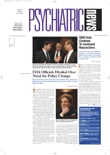Risk taking is a big part of life for everyone, but especially for persons with schizophrenia because of cognitive deficits, frequent lack of insight, and paranoid and delusional symptoms.
Thus the question arises: How well do persons with schizophrenia assess the chances of misfortune befalling them? Not only as well as healthy individuals, but even better, a new study surprisingly suggests.
The study was conducted by Kristen Prentice, Ph.D., an instructor in psychiatry at the University of Maryland; James Gold, Ph.D., a professor of psychiatry at Maryland; and William Carpenter Jr., M.D., a professor of psychiatry at the university and director of the Maryland Psychiatric Research Center.
The study was funded by the National Institute of Mental Health and the National Alliance for Research on Schizophrenia and Depression, and its findings appear in the March American Journal of Psychiatry.
Twenty-five individuals with schizophrenia and 23 healthy comparison subjects similar in age, gender, and ethnicity participated in the study. The schizophrenia subjects had been stabilized with antipsychotic medications for at least four weeks before the study started.
Each subject was asked to complete a questionnaire that has been widely used in risk-perception research. The questionnaire asked respondents to estimate how vulnerable they believed themselves to be, compared with other adults of the same age and gender, to 40 different adverse events.
The events were categorized as controllable, uncontrollable, and neutral. For example, “being injured in a car from not wearing a seatbelt” or “getting lung cancer” were placed under the “controllable event” rubric. “Getting a cold” or “experiencing an earthquake” were placed under the “uncontrollable event” heading. “Developing asbestos poisoning” or “suffering a fatal fall” were grouped under “neutral events.”
The healthy comparison subjects believed they were less likely than other adults of their age and gender to be susceptible to the unfavorable events listed on the questionnaire—especially the controllable ones. The schizophrenia subjects did too, but not to the same extent as the healthy subjects.
The question then was how to interpret these findings. First, many studies, not just this one, have found that people generally believe that they are unlikely to experience unfortunate events, especially unfortunate events over which they have control. So this optimistic outlook seems to be widespread. In contrast, there is also reason to believe that such a rose-colored view may not be realistic.
In other words, while it is difficult to judge whether such buoyancy is actually warranted on a person-by-person basis, scientists can definitely pronounce it unjustified when it is observed in a group of people, Prentice explained in an interview.
For example, she said, “If I pick a random sample of people and ask them how likely they are, relative to everyone else or to other people like themselves, to have a particular unpleasant experience, a purely unbiased and statistically reasonable answer would be `equally likely.' But when most of the people in my random sample say `less likely,' the math just can't work, and we know that the group shares an unrealistic optimism.”
Thus, if one accepts that individuals usually display an unrealistic optimism about their vulnerability to adversity, one can conclude that persons with schizophrenia stabilized on antipsychotic medications view their susceptibility to adversity somewhat more realistically than people generally do.
“It is always a pleasant surprise,” said Prentice, “when the data suggest that schizophrenia patients have a potential advantage over healthy adults. We seldom see that in our research.”
Prentice and her colleagues are now gearing up for a related study of schizophrenia patients' decision making with special emphasis on risk-taking and risk-avoidance behaviors. “Since we have a major interest in how patients make decisions about clinical-research participation,” she said, “we will also look at how risk attitudes might influence those decisions.”
Am J Psychiatry 2005 162 507
